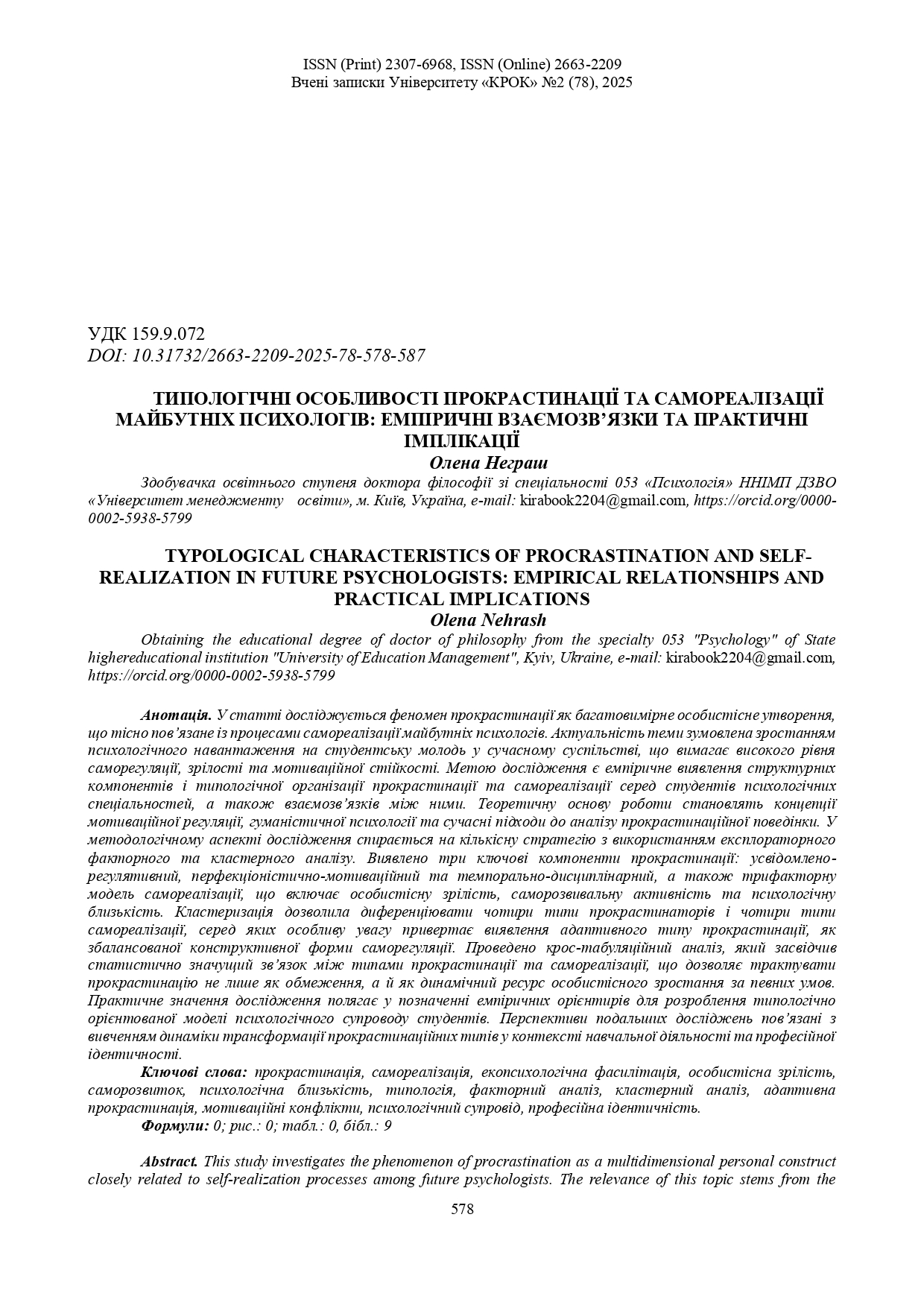TYPOLOGICAL CHARACTERISTICS OF PROCRASTINATION AND SELF-REALIZATION IN FUTURE PSYCHOLOGISTS: EMPIRICAL RELATIONSHIPS AND PRACTICAL IMPLICATIONS
DOI:
https://doi.org/10.31732/2663-2209-2025-78-578-587Keywords:
procrastination, self-realization, ecopsychological facilitation, personal maturity, self-development, psychological closeness, typology, factor analysis, cluster analysis, adaptive procrastination, motivational conflicts, psychological support, professional identityAbstract
This study investigates the phenomenon of procrastination as a multidimensional personal construct closely related to self-realization processes among future psychologists. The relevance of this topic stems from the increasing psychological burden on student youth in contemporary society, which demands high levels of self-regulation, maturity, and motivational stability. The research aims to empirically identify the structural components and typological organization of procrastination and self-realization among psychology students, as well as the interrelationships between them. The theoretical foundation of the work is based on concepts of motivational regulation, humanistic psychology, and contemporary approaches to analyzing procrastinatory behavior. Methodologically, the study employs a quantitative strategy utilizing exploratory factor analysis and cluster analysis. Three key components of procrastination were identified: conscious-regulatory, perfectionist-motivational, and temporal-disciplinary, along with a three-factor model of self-realization encompassing personal maturity, self-developmental activity, and psychological intimacy. Clustering allowed for the differentiation of four types of procrastinators and four types of self-realization, with particular attention drawn to the identification of an adaptive procrastination type as a balanced constructive form of self-regulation. Cross-tabulation analysis was conducted, which confirmed a statistically significant relationship between procrastination types and self-realization, enabling the interpretation of procrastination not only as a limitation but also as a dynamic resource for personal growth under certain conditions. The practical significance of the study lies in establishing empirical guidelines for developing a typologically oriented model of psychological support for students. Future research prospects are related to studying the dynamics of procrastination type transformation in the context of academic activity and professional identity.
Downloads
References
Журавльова, О., & Журавльов, О. (2020). Типологічні особливості прояву прокрастинації в студентів. Psychological Prospects Journal, 36, 86-99. https://doi.org/10.29038/2227-1376-2020-36-86-99
Лушин, П. В. & Сухенко, Я. В. (2022). Протокол екофасилітативної сесії як інструмент індивідуального професійного розвитку суб’єкта психологічної допомоги: метод. рек. до курсу «Психологічна допомога особистості: екофасилітативний підхід». Київ: ДЗВО «УМО».
Максименко, С. Д. (2006). Психологія особистості: генетичний підхід. Київ: ВПЦ «Київський університет».
Субашкевич, І. Р. (2023). Особливості академічної прокрастинації студентської молоді. Соціально-економічні відносини в цифровому суспільстві, 15, 112–118.
Сухенко, Я. В. (2018). Семантичний диференціал для оцінки освітньої траєкторії особистості. Психолінгвістика, 24(1), 320-342. https://doi.org/10.31470/2309-1797-2018-24-1-320-342
Burka, J. B., & Yuen, L. M. (2008). Procrastination: Why you do it, what to do about it. Cambridge: Da Capo Press.
Pychyl, T. A., & Sirois, F. M. (2016). Procrastination, emotion regulation, and well-being. In F. M. Sirois & T. A. Pychyl (Eds.), Procrastination, health, and well-being (pp. 163-188). Elsevier Academic Press.
Rothblum, E. D., Solomon, L. J., & Murakami, J. (1986). Affective, cognitive, and behavioral differences between high and low procrastinators. Journal of Counseling Psychology, 33(4), 387-394.
Steel, P. (2007). The nature of procrastination: A meta-analytic and theoretical review of quintessential self-regulatory failure. Psychological Bulletin, 133(1), 65-94.

Downloads
Published
How to Cite
Issue
Section
License

This work is licensed under a Creative Commons Attribution-NonCommercial 4.0 International License.

